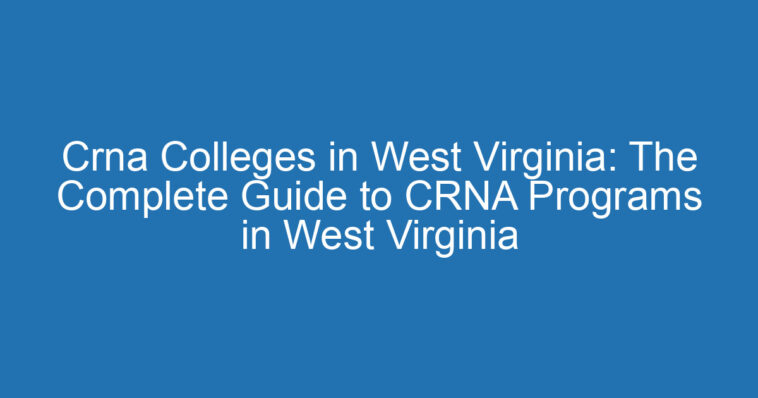West Virginia, known as the Mountain State, offers opportunities for aspiring Certified Registered Nurse Anesthetists (CRNAs) to pursue their education and training. While there are limited options for CRNA programs in West Virginia, the available colleges provide quality education and prepare students for a rewarding career in anesthesia.
What is CRNA All About and Reasons To Pursue A Career In The Field
Certified Registered Nurse Anesthetists (CRNAs) are advanced practice registered nurses (APRNs) who specialize in providing anesthesia care to patients in a variety of healthcare settings. Here’s a summary of what CRNAs do and reasons why you might consider pursuing a career as a CRNA:
1. Anesthesia Expertise:
CRNAs are highly skilled professionals who administer anesthesia to patients before, during, and after surgical or medical procedures. They work closely with surgeons, anesthesiologists, and other healthcare professionals to ensure patient safety and comfort during anesthesia administration.
Education and Training: To become a CRNA, you must complete a Master’s or Doctoral degree in nurse anesthesia. The educational program includes rigorous coursework in advanced physiology, pharmacology, pathophysiology, and anesthesia principles.
2. Autonomy and Responsibility:
CRNAs often work independently and have a high level of autonomy in their practice. They are responsible for assessing patients, determining appropriate anesthesia plans, administering anesthesia, monitoring patients’ vital signs, and managing pain during and after procedures. This level of responsibility allows CRNAs to play a critical role in patient care.
3. Versatile Career Opportunities:
CRNAs are in demand and can work in various healthcare settings, including hospitals, surgical centers, dental offices, obstetric units, pain management clinics, and the military. This versatility provides opportunities for career growth, specialization, and the chance to work in different healthcare environments.
4. High Earning Potential:
CRNAs are among the highest-paid nursing professionals. Their specialized skills and responsibilities often come with competitive salaries. Additionally, CRNAs may have the opportunity to earn additional income through overtime, on-call shifts, or working in high-demand areas or specialties.
5. Job Outlook and Demand: The demand for CRNAs continues to grow due to factors such as an aging population, increased need for surgical procedures, and expanded roles of APRNs in healthcare. This strong job outlook provides stability and potential job opportunities in various geographic locations.
6. Patient Care and Impact: Becoming a CRNA allows you to have a direct impact on patient care and outcomes. You are involved in every step of the anesthesia process, ensuring patient safety, pain management, and comfort during procedures. Being able to provide vital support to patients during critical moments can be rewarding and fulfilling.
Considerations for Choosing a CRNA College in West Virginia
When choosing a CRNA college in West Virginia, there are several important factors to consider. These factors include accreditation, faculty expertise, clinical opportunities, and alumni success.
Accreditation is a crucial aspect to consider when selecting a CRNA college. Accreditation ensures that the program meets the highest standards of quality and prepares students for the challenges of the profession. The COA is the accrediting body for nurse anesthesia programs in the United States. It is important to choose a CRNA college that holds accreditation from the COA, as it guarantees that the program meets the necessary educational standards.
Faculty expertise is another vital consideration. Look for colleges that have experienced faculty members who are actively engaged in clinical practice and research. Faculty members with extensive experience in the field can provide valuable insights and mentorship to students, enhancing the learning experience.
Clinical opportunities play a significant role in the education of CRNAs. Look for colleges that provide a wide range of clinical rotations at reputable healthcare institutions. The opportunity to work with diverse patient populations and gain exposure to different clinical settings will greatly enhance your learning and prepare you for the challenges of anesthesia practice.
Alumni success is an important indicator of a college’s reputation and the quality of its program. Research the achievements of alumni from the CRNA colleges you are considering. Find out if they have successfully passed their certification exams and secured desirable employment opportunities. Alumni success can give you confidence in the program’s ability to provide a strong foundation for your future career.
CRNA Education and Requirements:
Before we delve into the CRNA colleges in West Virginia, it is important to understand the education and requirements necessary to become a CRNA. To become a CRNA, individuals must first earn a Bachelor of Science in Nursing (BSN) degree, pass the National Council Licensure Examination for Registered Nurses (NCLEX-RN) to become a licensed RN, gain experience in an acute care setting, and finally, complete a Master of Science in Nursing (MSN) or Doctor of Nursing Practice (DNP) program with a specialization in nurse anesthesia. CRNA programs typically take between 24 to 36 months to complete.
Crna Schools in West Virginia
1. Charleston Area Medical Center School of Nurse Anesthesia:
Located in Charleston, West Virginia, the CAMC School of Nurse Anesthesia is the one of the two CRNA schools in the state. The school offers a 36-month full-time program that is delivered in an integrated classroom and clinical format. It is designed to prepare certified registered nurses for a career in the field of anesthesia.
Admission Requirements: To be considered for admission, applicants must hold a current registered nurse (RN) license, possess a bachelor’s degree in nursing (BSN), and have a minimum of one year of critical care experience. Other requirements may include a competitive GPA, satisfactory GRE scores, letters of recommendation, and a personal statement.
Curriculum: The CAMC School of Nurse Anesthesia CRNA program offers a comprehensive curriculum that combines didactic coursework with hands-on clinical experiences. The didactic portion covers topics such as advanced pharmacology, physiology, pathophysiology, anesthesia principles, and patient assessment. Additionally, students learn advanced airway management techniques, regional anesthesia, and pain management.
Clinical Experiences: Clinical experiences are a crucial component of the CAMC CRNA program. Students gain valuable hands-on experience in various clinical settings, including operating rooms, critical care units, and labor and delivery suites. Under the guidance of experienced CRNAs and anesthesiologists, students learn to administer anesthesia to patients of all ages and conditions, ensuring their safety and comfort during surgical procedures.
Faculty and Resources: The CAMC School of Nurse Anesthesia boasts a highly qualified and experienced faculty consisting of CRNAs, anesthesiologists, and other healthcare professionals who are dedicated to providing quality education and mentorship. Students benefit from state-of-the-art simulation labs equipped with advanced technology, enabling them to practice and refine their skills in a safe environment. The program also offers access to a vast array of resources, including a comprehensive library and research facilities.
Certification and Career Prospects: Upon successful completion of the CAMC School of Nurse Anesthesia CRNA program, graduates are eligible to sit for the National Certification Examination (NCE) administered by the National Board of Certification and Recertification for Nurse Anesthetists (NBCRNA). Achieving certification leads to the coveted CRNA credential.
2. West Virginia University:
West Virginia University’s School of Nursing offers a 36-months Doctor of Nursing Practice (DNP) program with a specialization in Nurse Anesthesia. The program provides comprehensive training in anesthesia practice and prepares students to become CRNAs.
Admission Requirements: To be eligible for admission, prospective students must possess a valid registered nurse (RN) license, a bachelor’s degree in nursing (BSN), and a minimum of one year of critical care experience. Additional requirements may include a competitive GPA, satisfactory GRE scores, letters of recommendation, and a personal statement.
Curriculum: The WVU CRNA program curriculum is divided into didactic coursework and clinical experiences. The didactic portion covers a wide range of topics, including advanced physiology, pharmacology, pathophysiology, anesthesia principles, and patient assessment. Students also receive training in advanced airway management, regional anesthesia, and pain management.
Clinical Experiences: Clinical experiences are a vital component of the WVU CRNA program. Students gain hands-on experience in diverse clinical settings, including operating rooms, labor and delivery suites, and intensive care units. Under the guidance of experienced CRNAs and anesthesiologists, students learn to administer anesthesia to patients of all ages and backgrounds, ensuring their safety and comfort during surgery or medical procedures.
Faculty and Resources: WVU CRNA program faculty members are highly qualified and experienced CRNAs and anesthesiologists who are dedicated to providing quality education and mentorship. The program also offers state-of-the-art simulation labs, equipped with advanced technology to simulate real-life anesthesia scenarios. These resources enhance students’ skills, critical thinking abilities, and decision-making processes.
Certification and Career Prospects: Upon completing the WVU CRNA program, graduates are eligible to sit for the National Certification Examination (NCE) administered by the National Board of Certification and Recertification for Nurse Anesthetists (NBCRNA). Successful completion of the NCE leads to the CRNA credential.
Conclusion
West Virginia offers limited but reputable options for individuals interested in pursuing a career as a CRNA. The CAMC School of Nurse Anesthesia and the DNP Nurse Anesthetist program at West Virginia University’s School of Nursing provide the necessary education and training to become a certified registered nurse anesthetist. Aspiring CRNAs in West Virginia can explore these programs to embark on a fulfilling and rewarding career in anesthesia. Choosing the right CRNA school would put you on the right path to becoming a Nurse Anesthetist.




